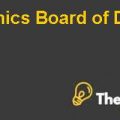
Efficiency Ratios
Exhibits 4 and 10 are used for analyzing the efficiency performance of the company and it is determined from the overall analysis that the company is not efficiently utilizing its assets. The days receivable ratio of the company increased in the year 2008 as compared to the previous years (2004 to 2007). Whereas, in 2004 the days receivable ratio of the company was 32.0 but in 2008 it increased to 35.6 which indicated an increase in the time period that the company takes in order to collect its receivables.
The days of inventory ratio of Dell also showed an increase in 2008 as compared to the previous years (from 2004-2007). However, in 2004 days of inventory ratio of Dell was 3.5 while in 2008 it increased to 8.7, this indicated that the days of inventory ratio of the company greatly increased during the five years time period.
The days of inventory ratio increment during five years showed an increase in the time duration which Dell took in order convert the inventory into goods sold. The days payable ratio of Dell for the year 2008 also indicated an increase as compared the previous years (from 2004-2007) as in 2004 days payable ratio was 78.8 which increased to 84.8 in the year 2008, this indicated that the company could delay the compensations to its dealers. The total assets turnover ratio of the company was almost constant from2004 till 2008, whereas, as in 2004 it was 2.1x and in 2008 it remained the same at 2.2x for Dell.
Financial leverage Ratios
By analyzing the financial leverage ratios of Dell it is concluded that the level of debt is not high as the company does not use much debt to finance. The debt to total assets ratio in 2008 decreased in the previous years from 2004-2007, it was 2.6% in 2004 but in 2008 it reduced to 2.1%, this indicated the percentage of the assets of the company that are financed through debt.
Similarly, the interest coverage ratio of Dell during the period of five years from 2004-2008 has indicated a reduction; in 2004 the interest coverage ratio was 253.1x that decreased to 76.4x in 2008. The reduction in the Interest coverage ratio indicated that the company may be suffering from cash related issues.
The debt to common equity ratio, long term debt to common equity ratio and total debt to EBIT ratios of the company also showed the falling trend in the year 2008 than the previous year (2007). On the other hand, the EBITDA/Interest ratio as well as the EBIT / interest ratio of the company indicated an increase in 2008 than the previous year.
Question 2
Dell fare against its closest competitors
Dell has distinguished itself from the other closest competitors by selling the customers’ desired products and services directly to them.. However, direct-to-customer approach of Dell has worked great and gave the company a great success in the industry as compared to its major rivals. Since, most of the PC makers in the industry were following the distribution channel driven strategy so the direct-to-customer approach of Dell has given it the competitive advantage over its rivals.
The reason behind this direct-to-customer approach was to provide the customer superior experience while delivering them products and services that met their expectations. This was done by constantly focusing on providing the best possible experience by selling them computing services and products directly; this is the way Dell fared against its competitors.
Question 3
Recommendation
From the evaluation of the financial performance of Dell for the last few years it is suggested to Anthony Chan (portfolio manager of the Trinity Funds) to sell the shares in Dell due to the constant decrease in the financial performance of the company. Anthony Chan could sell the shares in Dell and make an investment in any of the major PC manufacturer company in the industry that performs better in the market than Dell.
Secondly, from the financial ratios of Dell it is examined that the decrease in the productivity and performance in 2008 of the company may continue in the future that may impact the long-term growth and success of Dell. Thirdly, on the basis of valuation metrics for Dell and its competitors, it is evaluated that the performance of the company is not adequate if compared to other major competitors. Therefore, it is recommended to Anthony Chan to sell the shares in the portfolio of Dell in order to enhance the success of the Trinity Fund Inc., as this falling performance and growth of Dell may affect the achievement of the Trinity Fund Inc.................................
This is just a sample partial case solution. Please place the order on the website to order your own originally done case solution.













